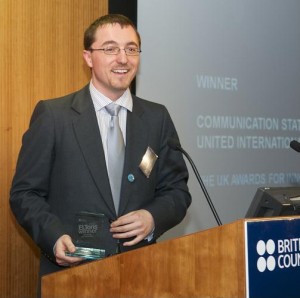Culture is often bound up in language and language learning and in our first category, absolutely educational, I found a very unusual way of learning a language….
For those of you who do not live in Europe I imagine that some of you sometimes think that we exaggerate the differences within Europe but when I talked to Natalia Pérez de Herrasti, a Spaniard living in Germany, I was introduced to a whole new perspective explaining the differences between Spaniards and Germans!
And if you want to test yourself on your understanding of some of these differences then I’ll be introducing you to the intercultural games from Diversophy which you can get on paper, in the virtual world, Second Life and as mobile phone apps.
Another app which I’ve just discovered is Google Translate for Animals. You can get this for Android phones and all you do is hold your phone in front of the animal to record what they are saying and Google Translate for Animals will translate this and speak the message for you. Unfortunately this is only in English at the moment but it really opens up a whole new world for us to interact with. There is also a video demonstrating how this works.
absolutely challenging
But we’ll start with an intercultural challenge. This came up while I was talking to Natalia Pérez de Herrasti and took me a little by surprise as it was not something that I had ever thought about. So let’s be absolutely challenging and see if you know the answer to this little intercultural situation. I’ll give you some time to think about that and reveal my reply at the end of the show!
absolutely educational
In our next category, absolutely educational, I’m going to let you listen to the homework of one of the students on the Communication Station course offered by UIC. What was her homework? To make a podcast about the Gay Pride carnival in London during which she learned a couple of intercultural differences along the way
absolutely first class
This way of learning English won first prize at the British Council ELTON awards in February for innovation in English language teaching and in our next category, absolutely first class So let’s find out how the students react and how you can sell this as a language learning course.
absolutely oriental
Natalia Pérez Herrasti who is Spanish has been teaching the language in Germany for almost twenty years. Natalia got in touch with us to tell us about the new four volume book she is writing in Spanish about a practical approach to intercultural communication, but our conversation ranged far and wide and the bit I want to play now is when Natalia suggested that one reason that the Spanish and Germans are so different is that the Spanish have a very oriental outlook. I really recommend a visit to Liu Yang’s exhibition of intercultural graphics as they are very thought-provoking.
absolutely playful
So images are one way of thinking about intercultural situations and games are another. Diversophy is the name of a collection of games which can be played face to face, online in Second Life or on your mobile phone. The Second Life games are free and there is lots of information and free samples on the Diversophy website. I’m hoping to be able to talk to someone from the Diversophy organisation in a future show so that I can get behind the thinking behind playing to learn.
And talking of playing to learn, have you thought about that little conundrum that we presented you with at the beginning of the show? And to make that into even more of a game I have chosen Natalia’s intercultural challenge as the snippet to use in the online dictation game for this show. By the way, did you notice the date today? One of the items I mentioned on the show is not true! I wonder if you can guess which one? If not, then April Fool!
Our next show will be coming to you from Dr. Laurent Borgmann in Germany on15th April
So long … stay tuned!
The host of this show is Anne Fox : Editor: Markus Scherer

